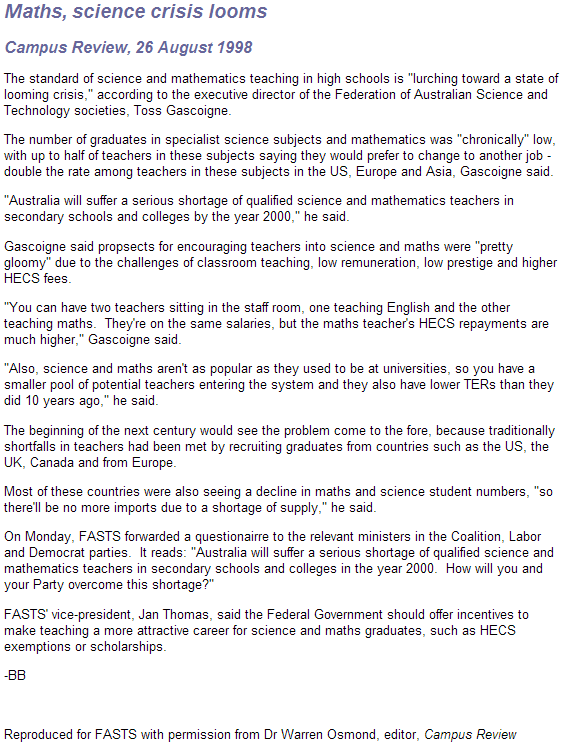|
|
|
|
|
|
|
News & Views item - October 2006 |
![]() "Study Sounds Maths Alarm -- Mathematics is a Subject in Crisis." (October
12, 2006)
"Study Sounds Maths Alarm -- Mathematics is a Subject in Crisis." (October
12, 2006)
The Australian's Dorothy Illing has received an advanced copy of a report commissioned by the Australian Council of Deans of Science which which has found that high school maths teachers are increasingly underqualified, unhappy and in short supply.
The study, The Preparation of Mathematics Teachers in Australia, was conducted by Melbourne University's Centre for the Study of Higher Education and is based on a survey of 3500 teachers and heads of maths departments across 841 secondary schools.
According to the study one in five maths teachers did not study maths beyond first year at university and one in 12 did no tertiary maths at all. Half are teaching subjects other than maths at school and more than a third are aged over 50, raising the problem of an ageing workforce.
Meanwhile the the support for mathematicians at our universities continues to decline while the 38 deans of science at our public universities say there is an "urgent need to prepare more people for mathematics teaching in schools".
The study makes the point that "Three in four schools currently experience difficulty recruiting suitably qualified teachers for mathematics classes, and the impending retirement of the baby boomers is set to exacerbate this situation."
In the forward to the report the deans comment that teachers younger than 30 were significantly less likely than older colleagues to hold a maths major or to have studied maths teaching methods and these "data, along with the changing face of modern mathematics, explains why 40 percent of those teaching at the moment were dissatisfied with their mathematics preparation as mathematics teachers... Fewer than half of the teachers were confident that they would be teaching mathematics in five years' time."
Now you might think that after the Minister for Education, Science and Training, Julie Bishop, made public her department's report on the impending shortfall of 19,000 scientists and engineers (audit of Australia's scientific, engineering and technology skills), that the deans' report's observation that many fields - such as engineering, agriculture, economics, medicine and business - require a sophisticated understanding of maths and statistics, but many school students are not receiving the high level of maths education required for these fields because just 64 per cent of schools now teach advanced maths, a situation brought about by fewer students wanting to take it up would galvanise her to constructive interaction.
To date there's been little evidence of it unless teacher and university bashing is deemed constructive. Certainly, there is evidence that the states' curriculums need revising as is clear from the report which as Ms Illing notes, "reveals considerable disparity between the states: NSW has fewer maths teachers per school while Queensland and Victoria have the most. Queensland finds it hardest to recruit maths teachers. While in Western Australia, curriculum changes were causing widespread 'dissatisfaction and concern'. It says there is no single way to measure teacher quality, in part because teacher registration is a state issue and graduates can enter the profession by many pathways."
So what's new? Well, the short answer is nothing.
On August 26, 1998 the Coalition government of John Howard had been in power for just under two-and-a-half years.

Somehow the word "pathetic" doesn't seem out of place in describing the Coalition Government's educational stewardship of the nation (see also http://nobelprize.org/nobel_prizes/economics/laureates/2006/info.pdf)
Added October 13.
In a follow up article by Ms Illing in today's Australian she writes in part:
The deans [of science] want national accreditation and a set of minimum qualifications for all maths and science teachers, a position that is likely to sit well with Ms Bishop who has been pushing for a national curriculum.
Queensland Education Minister and head of the national council of education ministers Rod Welford said he was not opposed to minimum qualifications as long as they were achievable.
But he said a large part of the problem was a shortage of teachers in areas such as maths, science and languages.
"Setting a (minimum) standard may be part of what's necessary to improve the quality of teaching, but it's not a panacea for the shortage of skilled maths and science teachers specifically," he said.
"What we need to do is get more people into university doing maths and science, or at least more teachers wanting to specialise in those areas."
David Panton, head of maths at the University of South Australia, said that in recent years universities had been experiencing a sharp decline in maths enrolments.
This was particularly critical in South Australia where fewer than 10 per cent of Year 12 students were now taking "double maths".